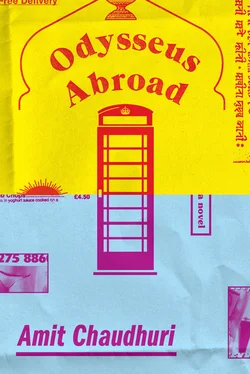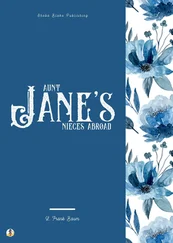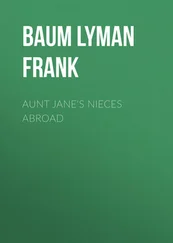The kitchen was filled with light. Behind him, framed by the window, were the chimneys of other houses. Natural light in the kitchen was bleak; it stood doing nothing, illuminating the fridge, last night’s plate and fork under the tap. It was sunlight inside a prison.
He boiled water and made tea. From the carton’s spout, whose edges were congealing into a frosty moustache, a splash of milk spilled on to the shelf; he quelled his momentary but frequent irritation with the carton, with mankind, and the dim-witted forces that governed the universe, and wiped the surface with a strip of kitchen tissue. Today he’d make that journey again — on the Northern Line. To his uncle’s house. “House” in a limited sense: it was a bedsit in the basement. But when Ananda thought of the place, it was of the house itself that he thought, 24 Belsize Park, where his uncle had occupied for twenty-one years the first-floor bedsit; then been moved by the Council down below, when a flat in the basement fell vacant and was converted into two bedsits by the Nigerian landlord Ananda had never seen, and repairs begun (in his uncle’s former home) on the crumbling ceiling. He’d heard that his uncle’s monthly rent — eighteen pounds fifty — was more or less static since 1961; it was possible the landlord wanted the whole first floor back to rent out as a single flat.
He stirred the milk in the mug, till, turning from clear but dark to pale brown and neutrally uniform, the water had become tea-like, the spoon negotiating the vortex it had set in motion by constantly evading, and sometimes colliding into, the submerged leviathan tea bag. Then he’d retrieved it from the pool on to his spoon, at once swollen and unresistant, dead but still smoking, an incredibly ugly thing. Unable to look at it, he tossed it into the bin.
—
His uncle was renowned as a world-conqueror. He’d heard the story time and time again, not least from his uncle. But the story would have no charge, no electricity, if those world-conquering qualities had never been in question. And it was that element of doubt and failure that was, as a result, highlighted in the recountings.
In fact, back home in India, even those who benefited from his uncle’s monthly or quarterly handouts, and hadn’t seen him in decades, recalled him with a smile in a mildly uncomplimentary way — thinking of the boy, with all his oddities, in Sylhet, and the young man in Shillong, where, just after Independence and Partition, he’d become a used-car salesman despite all his brilliance in school.
By then, 1955, Ananda’s father was in London, pursuing without focus his Chartered Accountancy qualifications, while his best friend sold cars in Shillong. Then the friend became his brother-in-law. For Uma travelled across the seas — in an aircraft — and joined Ananda’s father Satish (to whom she’d been betrothed before he left Calcutta). This journey — counting the interminable waiting on Uma’s part, the six years of not knowing whether or not it would happen, making her a kind of paragon of and authority on waiting — had been so long in the preparation that when it took place other things quickly followed: the wedding on a sunny August day in London, where Uma (or, to everyone, Khuku) was married to Satish in the presence of her younger brother Benoy, who was en route to Germany to train as an engineer. The priest was an exceptionally fair-skinned Punjabi whose Sanskrit sounded intimidatingly convincing and who was in London to study medicine. Most of this Ananda knew several times over (one doesn’t go to the epic — Brecht had putatively said — to learn the story, but for the pleasure of hearing it again), from his mother’s joyous repetition of the details, and her persistent weaving and shuttling of the mundane loom of memory. The fair-skinned priest, however, was a new element in the tale; he’d only heard about him two months ago.
So hardly any detail in that narrative could surprise Ananda any more, and yet — as was the case two months ago — he was often surprised. The things he hadn’t known his mother let slip by accident — for example, the fact that it had been a blazing summer that year in England. He knew, of course, the date of the wedding, and annually, in Bombay, there was an anniversary party when friends came home for dinner—8th August! — “What will you give me on 8th August?”—said she to his father, half-jokingly but with an innocent doggedness a few days prior to the event. And, though Ananda knew that they’d been married in England, he inevitably thought, by default, of 8th August in relationship to Bombay, and only recently did he see and imagine it more clearly — that, for them, the day’s history was forever located here . Realisation had come a few weeks ago, when his mother was still visiting him. The two of them had left Warren Street behind and were walking past Euston Square, when she pointed to the building of the Hindu Association where they were married, and said, “Strange, I remember it being much bigger!” Ananda glanced at the landmark. “Such a bright, dazzling day!” she said. “And it went on like that after I’d arrived, on and on, the darkness never seeming to come. People told me when I left Shillong, Be prepared for the rain, don’t be disheartened by the gloom. That first summer, I had no idea what they meant!”
—
It took her a year, she said to Ananda, to get his father on the rails again. He’d been adrift, distracted after his articleship by politics, poring over M. N. Roy, the “radical humanist,” going to listen to Rajani Palme Dutt speak at the Majlis, having cups of tea with Bengali Marxists, either not writing his exams or casually failing them when he did. She brought him in line. She, a mere matriculate in the third division, who’d never been to college, cast among women who’d either learnt dance and music at Santiniketan or were from Calcutta — she saw her husband’s future lay in her hands. And so her arrival into London was primarily to salvage and rescue. Ananda knew well she had these capacities. His mother, with whom he only quarrelled as a child, resenting her disciplinarian rages, her angry, too-large, flashing eyes, he’d begun to see — since he was sixteen — carried irreducible strength. At five foot one and a half inches, at once a diminutive, round-nosed busybody and the closest he’d known to the goddesses of myth. Wasn’t he, in his recent doting upon her, being fanciful? Of course he was — he knew that.
—
Even when she’d arrived here in 1955, unable to speak perfect English, noticeably little, it became clear she was a force and that she could command respect — maybe even intimidate. Implausibly, she got a job at the Naval Advisory Department in the Indian High Commission at Aldwych. At the interview, she made it a point to answer the questions her husband had coached her to expect, though those questions weren’t asked. She settled into employment, which involved an irregular sending out of memos to and receiving them from various commanders of the Indian navy. The High Commission had been seized by a “reorganisation,” and the result was that, in six months, at the end of the reorganisation — a word whose significance she grasped slightly, but whose melee she was happy to be part of — she was drawing a handsome salary of fifty-eight pounds a month, enough to look after Satish’s needs and hers, and give him time to devote himself entirely to the shrine of accountancy.
She sat at her desk in India House, comfortably negligent of office friendships, openly disdainful of the gossip between the Indian women near her, Mrs. Sinha and Mrs. Hussein, forensically perplexed by the conversations Englishwomen had (“So she said…and I said…and then she said…”). She mimicked and relived these “He saids” and “She saids” for her husband. Going to the cinema, they agreed that the English, unlike the melodramatic Indians, were natural actors; but they also noted that this race behaved and spoke in normal circumstances like they were in a film, with a peculiar self-consciousness, as if their gestures and words were being recorded. There didn’t appear to be a complete separation between fantasy and social life for the English. Dr. Krishnan, the departmental head, had discovered what an exceptional singer she was, and was willing to overlook her eccentric uninvolvement in office life. “She is an artist, and she is an asset,” he said, meaning it was okay for her to not fit in. He encouraged her to sing at the India Office’s public functions — on numerous commemorations and national days. Not everyone liked this. Miss Watkins, her immediate superior, resented her privileges and chafed at her. Then, one morning, when she’d commanded her: “Uma, bring me that file!” Khuku had lost her calm — as she did periodically — and tossed it towards Miss Watkins’s table, saying, “ There’s your file!” (Ananda, hearing this episode recounted, thought how his mother loved to throw things when she was angry. The servants knew it. Her husband knew it.) This was followed by an instant of scandalised undecidedness. Yet Miss Watkins didn’t retaliate. In the next few months, she was unflinchingly civil to Khuku. When Dr. Krishnan died suddenly of a heart attack, Khuku was transferred to the consular department on South Audley Street.
Читать дальше











